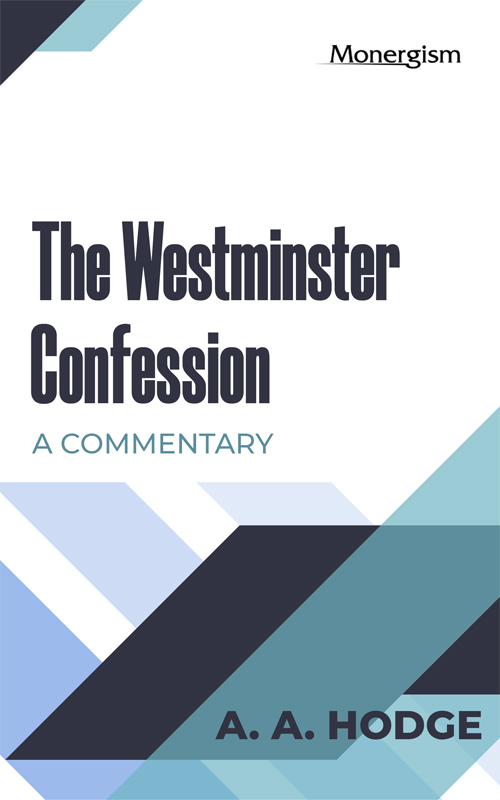 by A. A. Hodge
by A. A. Hodge
In ePub, .mobi and .pdf formats
In this classic guide to The Westminster Confession of Faith, A.A. Hodge examines each chapter of the confession in a clear and understandable way. This volume is intended both to facilitate and stimulate study of the Westminster Confession and is excellent material for discipleship - designed for Presbyterians, but accessible and useful for everyone.He begins with a short history of the creeds and confessions in general and a history of the Westminster Confession in particular, including the historical and theological events which inspired its composition. Most of the volume is rightly devoted to detailed commentary on the Confession itself. Each chapter includes a detailed exposition of the Confession, and concludes with dozens of questions for review and reflection.Each chapter includes a detailed exposition of the Confession, and concludes with dozens of questions for review and reflection. A Commentary on the Confession of Faith also includes appendices which contain statements by Charles Hodge and Henry B. Smith, as well as the 1879 Auburn Declaration and the Declarative Act of the United Presbyterian Synod of Scotland.
---------
All that man is to believe concerning God, and the entire duty which God requires of man, are revealed in the Holy Scriptures, and are to be believed and obeyed because contained therein, because it is the word of God. This divine word, therefore, is the only standard of doctrine which has intrinsic authority binding the conscience of men. And all other standards are of value or authority only in proportion as they teach what the Scriptures teach.
While, however, the Scriptures are from God, the understanding of them belongs to the part of men. Men illumined by the Holy Spirit must interpret to the best of their ability each particular part of Scripture separately, and then combine all that the Scriptures teach upon every subject into a consistent whole, and then adjust their teachings upon different subjects in mutual consistency as parts of a harmonious system. Every student of the Bible must do this, and all make it obvious that they do it by the terms they use in their prayers and religious discourse, whether they admit or deny the propriety of human creeds and confessions. If they refuse the assistance afforded by the statements of doctrine slowly elaborated and defined by the Church, they must make out their own creed by their own unaided wisdom. The real question is not, as often pretended, between the word of God and the creed of man, but between the tried and proved faith of the collective body of God’s people, and the private judgment and the unassisted wisdom of the repudiator of creeds.
Creeds and Confessions, therefore, have been found necessary in all ages and branches of the Church, and, when not abused, have been useful for the following purposes: (1.) To mark, disseminate and preserve the attainments made in the knowledge of Christian truth by any branch of the Church in any crisis of its development. (2.) To discriminate the truth from the glosses of false teachers, and to present it in its integrity and due proportions. (3.) To act as the basis of ecclesiastical fellowship among those so nearly agreed as to be able to labor together in harmony. (4.) To be used as instruments in the great work of popular instruction.
It must be remembered, however, that the matter of these Creeds and Confessions binds the consciences of men only so far as it is purely scriptural, and because it is so; and as to the form in which that matter is stated, they bind those only who have voluntarily subscribed the Confession, and because of that subscription.
-----
Table of Contents
A Short History of the Creeds and Confessions
Some Account of the Origin of the Westminster Confession and Catechisms
Chapter 1: Of the Holy Scripture
Chapter 2: Of God and the Holy Trinity
Chapter 3: Of God's Eternal Decree
Chapter 4: Of Creation
Chapter 5: of Providence
Chapter 6: Of The Fall of Man, of Sin, and of the Punishment Thereof
Chapter 7: Of God's Covenant With Man
Chapter 8: Of Christ the Mediator
Chapter 9: Of Free Will
Chapter 10: Of Effectual Calling
Chapter 11: Of Justification
Chapter 12: Of Adoption
Chapter 13: Of Sanctification
Chapter 14: Of Saving Faith
Chapter 15: Of Repentance Unto Life
Chapter 16: Of Good Works
Chapter 17: Of Perseverance of the Saints
Chapter 18: Of Assurance of Grace and Salvation
Chapter 19: Of the Law of God
Chapter 20: Of Christian Liberty and Liberty of Conscience
Chapter 21: Of Religious Worship and the Sabbath Day
Chapter 22: Of Lawful Oaths and Vows
Chapter 23: Of the Civil Magistrate
Chapter 24: Of Marriage and Divorce
Chapter 25: Of the Church
Chapter 26: Of the Communion of the Saints
Chapter 27: of the Sacraments
Chapter 28: Of Baptism
Chapter 29: Of the Lord's Supper
Chapter 30: Of Church Censures
Chapter 31: Of Synods and Councils
Chapter 32: Of the State of Men after Death, and of the Resurrection of the Dead
Chapter 33: Of the Last Judgment
Appendix 1: The Meaning of 'System of Doctrine': Old School vs. New School
Appendix 2: The Auburn Declaration and The Declaratory Act
Appendix 3: What is Presbyterianism? by Charles Hodge
Appendix 4: What is Meant by Adopting the Westminster Confession?
Appendix 5: On the Passages of the Confession Concerning the Magistrate's Power as to Religion and the Church
